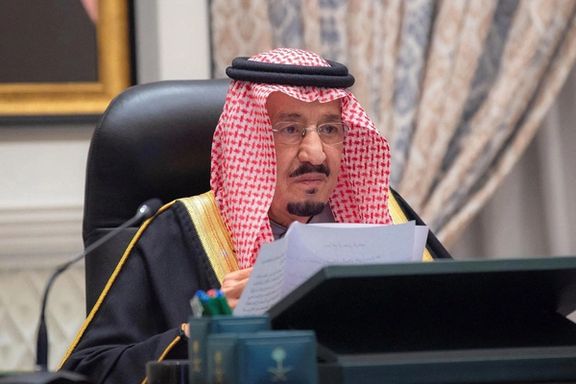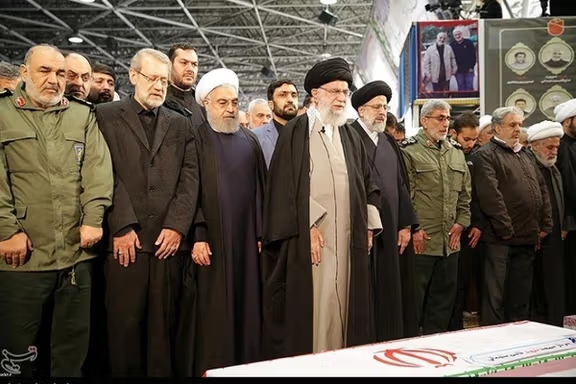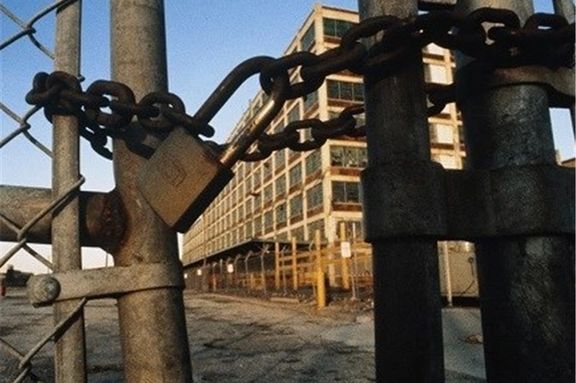Iran Says Omicron Has Spread In 12 Provinces

The Omicron variant of the coronavirus has spread in a dozen Iranian provinces, bringing confirmed cases to 43, the health ministry announced on Thursday.

The Omicron variant of the coronavirus has spread in a dozen Iranian provinces, bringing confirmed cases to 43, the health ministry announced on Thursday.
The head of Iran’s taskforce to combat coronavirus, Hamid Souri, has said that the PCR tests Iran uses may not be enough to detect the new variant.
World Health Organization Director-General Tedros Adhanom Ghebreyesus has warned that Omicron could lead to a “tsunami” of Covid-19 cases, because it is more transmissible and is circulating around the globe at the same time as the Delta variant.
Iran was the second country after China where the coronavirus spread in in early 2020 and Covid-19 became an epidemic, but the government was slow to admit the crisis and act to contain it, leading to the worst Covid crisis in the Middle East.
Iran has announced that it has closed all its land and sea borders to non-Iranians for 15 days, but air travel is still ongoing except from eight African and four European countries, namely England, France, Norway and Denmark.
A senior official of Iran’s national Coronavirus headquarters says the new variant will be the dominant type of Covid-19 in Iran in the coming weeks.
Iran, which confirmed the first Omicron case on Sunday, December 19, is one of the worst hit countries in the region by more than 131,000 officially announced deaths since February 2020.

Saudi Arabia's King Salman has expressed concern about Iran's lack of cooperation with the international community on its nuclear and ballistic missile programs.
King Salman bin Abdulaziz said in an address to the kingdom's advisory Shura Council on Wednesday that he hoped Iran would change its "negative" behavior in the region and choose dialogue and cooperation.
"We follow with concern the Iranian government’s policy which is destabilizing regional security and stability, including building and backing sectarian armed militias and propagating its military power in other countries," the 85-old ruler said in a speech published by state news agency SPA.
"(We follow with concern) its lack of cooperation with the international community regarding its nuclear program and its development of ballistic missiles," he added.
Saudi Arabia, a major Western ally in the Gulf, has been locked in a bitter rivalry with Iran across the Middle East where both sides have backed opposing factions in several conflicts including in Yemen, Syria and Lebanon.
The two countries broke diplomatic ties in early 2016 when mobs in Iran attacked and ransacked the Saudi embassy.
In a step to ease tensions, Saudi and Iranian officials met in a series of direct talks earlier this year but they have yet to yield a breakthrough.

Iran says Qasem Soleimani was assassinated with the direct order of former US president Donald Trump, vowing to bring the perpetrators to justice.
Iran’s Foreign Ministry said in a tweet on Wednesdaythat the killing of the IRGC’s Qods (Quds) force commander was an epitome of “state terrorism”.
As the country is getting ready to hold ceremonies for the second anniversary of Soleimani’s killing threats and rhetoric by Iranian officials have increased. Iran Is planning a long list of events lasting ten days to mark Soleimani’s “martyrdom”. He was killed by a US drone strike on January 3, 2020, as he arrived in Baghdad.
Last week, the head of Iran’s Judiciary, Gholamhossein Mohseni-Ejei, renewed vows to avenge Soleimani’s killing, saying that it will definitely happen, and it will be harsh.
A lot of high-ranking Iranian military personnel and political figures, including Iran’s Supreme Leader Ali Khamenei, have promised revenge for the Soleimani's targeted killing.
“They must know that whenever possible, at the appropriate time, they must face revenge”, Khamenei said some two weeks before the first anniversary of his killing.
Iran has listed a host of US and Israeli officials as responsible for carrying out the attack.

Israel is considering several scenarios for an attack on Iran, with its military saying it can act immediately if it received the go ahead from the government.
According to Haaretz on Wednesday, Israel has allocated an extra $2.9 billion to its military budget for the sole purpose of attacking the Islamic Republic.
Military intelligence and more advanced cyber security systems for a more effective list of targets, as well as acquiring new weapons and conducting air force exercises are some measures to better prepare for a possible attack on Iran.
Chief of Staff Lt. Gen. Aviv Kochavi has said that “The IDF’s ability to maneuver has improved considerably, built on our ability to transfer quality intelligence to troops, increasing the number of armaments and personnel...”
In a document presented to the political leadership, the Israeli military has prepared several scenarios with different targets, but it stresses that it is not easy to assess how Tehran would react or to predict the outcome of the attacks on Iran’s nuclear program.
In their scenarios, Israel is also getting ready to fight Hezbollah in Lebanon and Hamas in the Gaza Strip as consequences of the attack on Iran.
Israel is also spending nearly $300 million to build a fence along the Lebanese border that will include high-tech military equipment able to thwart any attempt to breach it.
For the potential threats from the Gaza strip, the military has taken another approach. It said that the current relative calm between Israel and Gaza is mainly the result of transferring civilian aid to people of the enclave, adding that the IDF intends to allow even more goods to enter the coastal strip in the coming year.
The IDF has also expanded it talks with Hamas on exchanging prisoners and returning the bodies of Israeli soldiers that are been held by the group.
Tuesday night, Israeli Defense Minister Benny Gantz hosted Palestinian Authority President Mahmoud Abbas at his home in Rosh Ha’ayin, probably to discuss the Palestinians’ possible response following an attack on Iran.
Israel is also increasing its military cooperation with Egypt, Jordan, Cyprus, Greece and some Persian Gulf countries that could guaranty greater legitimacy for an attack to stop Iran from building a nuclear bomb and contain its support for the militant groups in the region. According to IDF estimates presented to the government, Iran can build a nuclear bomb in about two years.
To counter Iran’s growing arsenal of ballistic missiles, Israel has also signed several contracts in the past year to improve its air defense system, already one of the best in the world.
The Israeli military has also boosted the level of its attacks on Iran’s shipments of munitions to its proxy forces, with the IDF claiming that it stopped about 70 percent of the flow of arms from Iran, Syria, and Iraq into Lebanon.
The attacks have probably hindered Iran’s transfer of complex weaponry to its supporters because now Tehran must make the shipments very smaller, sometimes so small that can be transferred by civilian airline flights.
During its recent massive military drills, Iran simulated an attack against Israel's Dimona nuclear reactor, which included launching 16 ballistic missiles and five suicide drones.
The Iranian military has said the wargames carried a stark warning to “threats made by the Zionist regime’s officials” while some in Iran believe they were meant to give bargaining power to Iran’s nuclear negotiators in Vienna.
Rhetoric has intensified between Iran and Israel in recent weeks as nuclear talks between Tehran and world powers have resumed in Vienna. Israel has vowed that if Iran's nuclear program reaches a stage close to production of weapons, it will act regardless of an agreement between world powers and Tehran.

Iran’s deputy minister for industry and trade has said that bank seizures of companies and factories has increased this year, amid a deepening economic crisis.
Mehdi Niyazi told local media that from April to September 1,793 industrial and trading companies were seized by banks after they failed to make loan payments. Most banks in Iran are fully or partly state owned.
Niyazi added that over 60 percent of companies in Iran have financial problems because of high inflation, estimated to be close to 50 percent and lack of finance.
He explained that many companies after seizure of ownership by banks stopped operations, a situation that would increase an already high unemployment rate. One bank that just last year had 60 companies under its receivership now has ownership of 160 firms.
The deputy minister partly blamed high interest rates the banks charge for the insolvency of companies struggling amid sanctions and an economic crisis.
Iran’s weak economy took a turn for worse in 2018 when the United States withdrew from the 2015 nuclear agreement and imposed tough sanctions on the country.

Dangerous levels of air pollution in Esfahan, Tabriz and more than a dozen other major Iranian cities have shut down schools and kindergartens.
According to Iran’s air quality control center, the air pollution indicator in several other cities, such as Tehran and Mashhad, has crossed the danger line for sensitive groups, but the authorities have not yet decided to close down schools in these cities.
Abed Maleki, a deputy governor for Tehran’s civil affairs coordination, said schools in the capital are not closed because the air pollution index in the city is still below 150, a level which makes it unhealthy for everyone.
However, he urged citizens, especially children and the elderly, to stay home until pollution levels decrease.
According to Ruhollah Motafker Azad, the representative of Tabriz in the parliament, the reason for the high concentration of air pollutants in Tabriz is burning mazut, a dirty fuel, instead of natural gas in its thermal power plant.
Mazut -- commonly called waste oil -- is a heavy, low quality fuel oil, only used when the facilities to blend or break it down into more conventional petro-chemicals such as diesel are not available.
Iran has the world's second largest natural gas reserves but becuae of lack of investments and technology, production is declining.